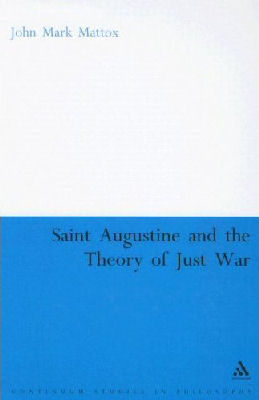
|
Posted January 23, 2007
Book: Saint Augustine and the Theory of Just War Author: John Mark Mattox Continuum. New York. 2006. Pp. 196 An Excerpt from the Jacket:
Fifth-century philosopher St. Augustine of Hippo sought to provide an answer to the question. His approach formed the foundation of the ‘just war’ tradition, which has had enormous influence upon moral-philosophical thought on military issues in the West ever since. This major new study identifies Augustine’s fundamental premises, reconstructs his just-war theory, and critically evaluates the reconstructed theory in light of his historical context and neo-Platonic and Christian philosophical considerations. An Excerpt from the Book: In some ways, Augustine’s just-war theory is an explanatory device to account for the way in which the elect of heaven find themselves engaged in war. In other ways, it is a prescriptive and a proscriptive device useful to fallen Man for the maintenance of the natural order – an order of which war appears to be a natural part. On the one hand, the inadequacy of Augustine’s theory as a strictly rational — and perhaps more importantly, completely failsafe – recipe for the conduct of a just war is clearly apparent. Nevertheless, it should be remembered that Augustine is the first to recognize these facts. And, indeed, the modern reader might expect that he would call them ‘facts’ about the theory as opposed to ‘faults’ that beset his theory more than they beset any other approach to the problem of just war. At no time does the first Christian philosopher promise a strictly rational account of anything. Rather, he merely assures us that human rationality is such that it can assist the honest seeker of truth in attaining an understanding of those eternal verities which lie, via the leap of faith, beyond the immediate grasp of unaided reason. Moreover, he has no expectation that any moral coping mechanism will be failsafe; life in the present world is fraught with perils to the extent that an appeal for divine grace offers Man the only real hope for justice, order, and peace – and then, in their perfect realizations, only in the world to come. On the other hand, the merits of Augustine’s theory, with its emphasis on the rightly intended maintenance of justice and order through the sole instrumentality of duly recognized agents of legitimate states, its absolute prohibition against the infliction of unnecessary harm to combatants and non-combatants alike, and its aim of a speedy restoration of a just peace, are of such enduring value to humankind as to warrant their continued contemplation. The interiority of Augustinism renders ultimately, impossible the objective specification of justice and injustice. Nevertheless, Augustine surely would inform his critics that, if true justice is ever to be found in this present world, it will be found in the deep recesses of the rightly ordered human heart; and that, though states rise and fall, it is only within that most important precinct that the theory of just war, or any other moral theory, can find genuine meaning and application. Table of Contents: 1. Saint Augustine and the Just-War tradition 2. The historical and philosophical landscape 3. Augustine’s just-war theory 4. Neo-Platonism and Augustinian Just War 5. Christianity and the Augustinian Just War 6. Augustine’s theory and beyond |
|
